The French Public Higher Schools of Art
Reims
École supérieure d’art et de design de Reims
about
The École Supérieure d’Art et de Design de Reims is a Public Institution for Cultural Cooperation (EPCC) that hosts 240 students, in two main options: art and design, the complementary nature of which gives its color to the teaching being done. The pedagogy aims to train contemporary artists and designers, each of them in a strategy of authoring. Experimentation and research permit the utilization of multiple techniques linked to contemporary artistic creation in the service of these projects. Numerous partnerships with higher university education render the research dynamic in its character and, each year, in each option, the involvement of businesses or outside institutions provides a context of practice that allows graduates to become extremely complete professionals.
All of the branches of product design are addressed: object, furniture, space, being conceived of in a visual manner and engaged with important societal questions. Two transversal, themed workshops: one linked to the culinary, the other to the plant, supported by specific experimentation and knowledge that enhance the designer’s field of activity. Graphic and multimedia design is particularly developed around the issues of the interface in communicating objects.
Art, being the common base for disciplines, is in Reims, a very specific option in its relationship with the issues of the contemporary artist: the option functions as a think tank, aiming for the artistic and social autonomy of the student.
The postgraduate programme allows students to follow a personal project in culinary design, and a business nursery-incubator can welcome young graduates.
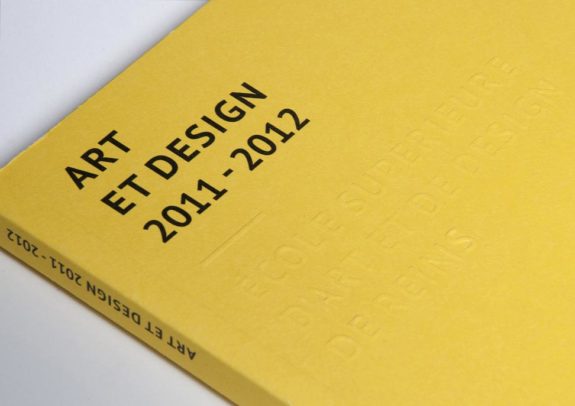
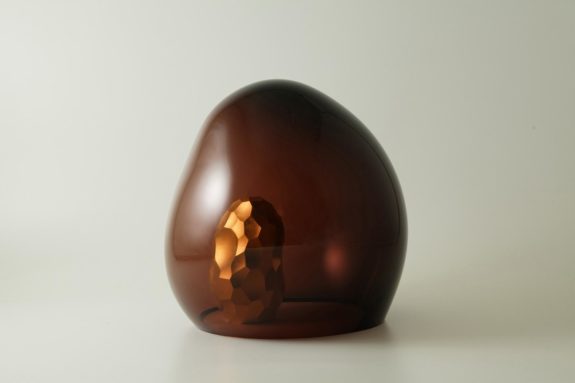
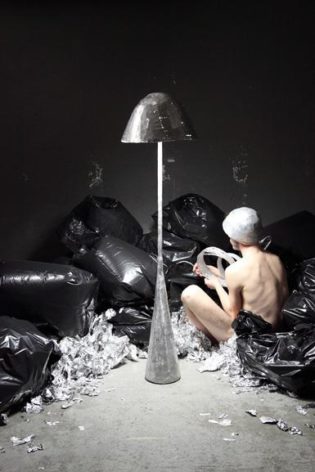
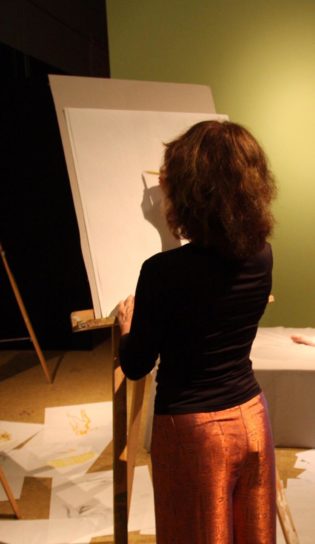
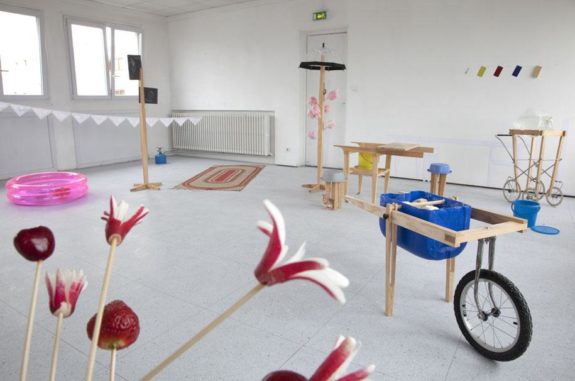
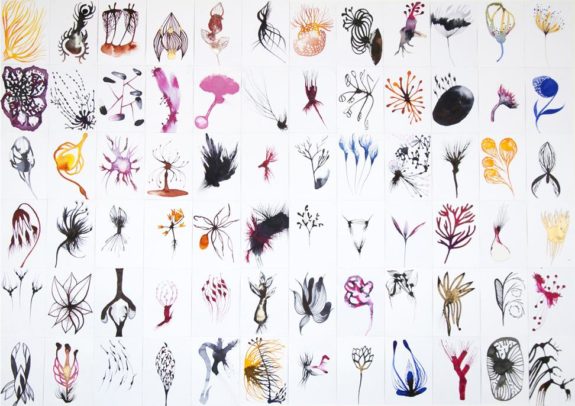
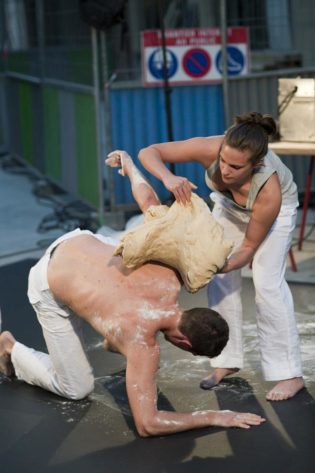
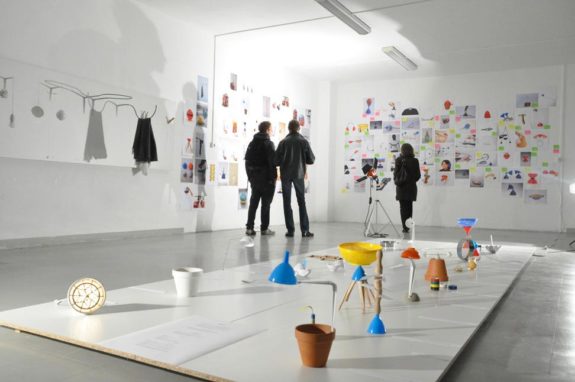
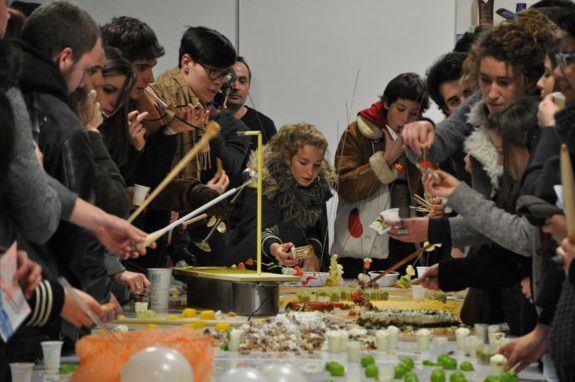
Annuel 2012 © ESAD de Reims
Emeline Lavocat, Platinum Core Salviati, 2011 © ESAD de Reims
Adrien Lardet, Sublimation, 2012 © Simon Thiebaut - École supérieure d’art et de design de Reims
Cours du soir © ESAD de Reims
DNSEP 2010, Magali Wehrung, panier piano © ESAD de Reims
Adrien Lardet, Design Végétal , 2012 © ESAD de Reims
Post-diplôme Design culinaire, 2011, performance au Lieu du design, Alexandra Roudière © ESAD de Reims
Semaine folle 2011, Sébastien Cordoléani © ESAD de Reims
Semaine folle, 2012, Laurent Duthion © ESAD de Reims
options
Art
Design
qualifications
DNA option Design
DNSEP option Art
DNSEP option Design mention design culinaire
DNSEP option Design mention design graph. et multimédia
DNSEP option Design mention design objet et espace
ongoing training
Drawing workshop
Observational drawing with life models, or still life experimenting various techniques and tools such as: charcoal, chalk, ink, watercolor, etc.
The notions addressed are – study of proportions- relationship with scale – relationship with space – notions of full and empty – working on movement – different moments when sketching – the search for a personal writing.
During each session, a certain number of these exercises, or variations thereof are done, each student appropriating them according to their own rhythm, level of skills and expectations.
Painting workshop
The classes are interested in all forms of expression and take different mediums into account: poster paint, watercolor, oil. The classes are underpinned by the issues of contemporary painting.
Aspects such as the theory of color, composition, form and the relationship with scale are dealt with all throughout the year. Matter and space are the subject of specific sessions and serve as a jumping off point for observation of the real, so as to then be developed in a more unique way.
Subjects are chosen so as to work water based techniques (water color, acrylic, poster paint) in addition to oil and the preparation of media (canvas, wood, paper); The objective is to allow each person to develop a personal writing while studying the tech and history of painting.
research units
Forms of social innovation – Design Research Unit
By “social innovation” we mean the interaction between creation and the social field. Because it aims to favor the well being of individuals and collectivities as much as possible, but also its “non-standard” nature, often led by unique actors, social innovation appears as a creative value, of which design can be the vector. Thus the posture of the designer is similar to that of the “social innovator”, touching ways of life, of production and of uses.
The Formes de l’Innovation Sociale research unit aims to federate and structure the actions, programmes and teaching in the ESAD that are linked to this issue, on a regional and international level. It takes the side of investing the field of design in its multidisciplinary openness and its transversality (object and graphic/multimedia). The idea is to secure that which is unique in Design research in the ESAD of Reims, without losing the precise nature of its specialities: Art, Culinary Design and Plant Design are the subject of distinct research.
research programmes
Art et Philosophie
Since 2010, the “Art and Philosophy” study days have been organized in partnership with the Philosophy department of the Literary Studies and Humanities UFR of the Université de Reims Champagne-Ardenne. They result in a common publication of the proceedings by Epure editions.
2010 : L’oeil et l’esprit. Merleau-Ponty between art and philosophy
2013: Discussions between art and philosophy. Languages and images with Gilles Deleuze.
2014: Re-appropriation in art – Pitfalls of author’s rights and the power of the fake in the era of Open Source.
Artist Run Spaces
Artist Run Spaces is a general research theme backed by the Master’s in Art of the ESAD. It hypothesizes a particular economy of production – that of Artist Run Spaces, as a possible matrix of a pedagogical and collaborative platform. How, through the analysis of the means that it has at its disposal and the means that it engages, can this functioning be a possible model for production in art? How and why can these modes of (auto-) production generate collaborative forms? To what extent can the formats of experiences be models of transmission? In other words, how can the observation of a particular structure – where domestic space is mixed with artistic activity, and the identity is distinct from that of a gallery or an institution to favor the exhibition as form, can it be the subject of a productive, constructive and even pedagogical research? This programme is put together with institutional partners, mainly international in origin (Goldsmiths College, London, SIAC of Chicago, Dar Al Munian in Morocco, etc.).
Banquet Scientique
After Paris at the 104 and Marseille at the Friche Belle de Mai, the Banquet Scientifique has moved to Reims.
The Banquet Scientifique is a stage concept offering the sharing of knowledge and flavors at the same time and in the same place.
This concept comes from a thinking on systems that favor transmission and on forms that can be given to such thinking. It is at the same time a culinary design performance and an interdisciplinary, and international, symposium that aims to question the modalities of academic research all the while providing a sensitive experience participants and audience.
The propositions take the form of oral communication, performances and visual oeuvres: designers, performers, visual artists, essay writers, musicians, philosophers and poets meet to speak about them or sing, theorize, dance, show or smell within the freedom given by the flavors of a feast.
Students from the culinary design workshop of the ESAD of Reims (class of 2013/2014) imagine the set design system that will allow for links to made between knowledge and discovery, pleasures of the eye and the mouth. Those of the Lycée des Métiers Gustave Eiffel prepare the meal. Participants enjoy a scientific experience similar to a symposium and an esthetic experience engaging sensitivity and perception. In 2013, the first two editions of the banquet had the theme of “Pillage and Waste”, one in the 104 in Paris, the other in the Friche de la Belle de Mai of Marseille (http://www.youtube.com/watch?v=XxifTGeqSUA).
magazines
activities and events
Lecture cycles dedicated to design and contemporary art. «Flash theory» themed days. International encounters of art and design.
“Folle” week: week long workshops bringing together designers, guest artists and all of the school’s students.
Participation in professional trade fairs and exhibitions: International food fair, Paris (Culinary design); Furniture trade fair, object (Object design); Designers Days, Paris.
post-curricular or extracurricular activities
Painting classes (poster paint, watercolors, oil) and observation drawing (life modeling and objects, charcoal, pastels, pencils…) on Monday, Tuesday and Wednesday evenings, from October to mid-May excepting school holidays.
international cooperation
Erasmus partnerships and cooperation agreements.
gallery
Espace Champagne : gallery and display windows of the school.
specific equipment
Wood, metal, plastics, digital milling machine, 3D printer.
Infography, photography, video, prototyping, modeling.
Pedagogical cuisine (gastronomical standards).
networks
ANdEA, Association des écoles supérieures d’art du Grand-Est, Art Accord, Cumulus, ALFA (Association des lieux de formation en art – Champagne-Ardenne et Picardie). Partenariats de recherche : CDHTE du CNAM, Paris ; URCA Reims-LSH/ Philosophie ; Institut de Recherche et Innovation-IRI/Centre Georges Pompidou, Paris ; IEHCA/CERMAVA et l’Équipe Alimentation (LEA) – Université François Rabelais, Tours ; Maison des sciences de l’Homme (MSH) de Paris Nord ; Centre de recherche en art (CRA) – Université de Picardie Jules Verne ; Institut-Mines Télécom – Télécom École de management et Télécom Sud Paris ; Centre de recherche environnement – Design et esthétique (CREDE), Université Paris I ; Collège universitaire de Sciences Po – Campus euro-américain de Reims, Goldsmiths College, Londres.
administrative team
Claire Peillod Directrice
Eric Balicki Administrateur
Véronique Pintelon Coordinatrice des études et chargée des relations internationales
Patricia Ribault Responsable de la recherche
Julien Tilmant Communication et Attaché de Presse
Catherine Lesprit Chargée de la scolarité
professors
Bruno Angella
Jean-Paul Augry
Olaf Avenati
Eric Blondin
Fabrice Bourlez
Germain Bourré
Marc Bretillot
Laurent Burte
Fabien Cagani
Gérard Cairaschi
Rozenn Canevet
Patrick Chapus
Earlwyn Covington
Ehrsam Ehrsam
Anne Fressard
Giuseppe Gabellone
Gaëlle Gabillet
Laurent Greslin
Jean-Michel Hannecart
Alexandre Lamarche-Ovize
Pierre-Yves Le Sonn
Cécile Le Talec
Guillaume Leblon
Philippe Legoff
Sara Lubtchansky
Véronique Maire
Manuela Marques
Laurence Mauderli
Daniel Meszaros
Laurent Meszaros
Patrick Nadeau
Portheault Philippe
Juliette-Maï Poirot
Christian Porri
Marie Proyart
Raoul Sbaiz
Rachel Skoronwski
Audrey Tenaillon
Renaud Thiry
Vivien Trelcat
Magali Wehrung
Duncan Wylie
contact
12 rue Libergier
51100 | Reims
tél. +33 (03) 26 89 42 70
fax +33 (03) 26 35 36 78
contact@esad-reims.fr
www.esad-reims.fr
students
240 students